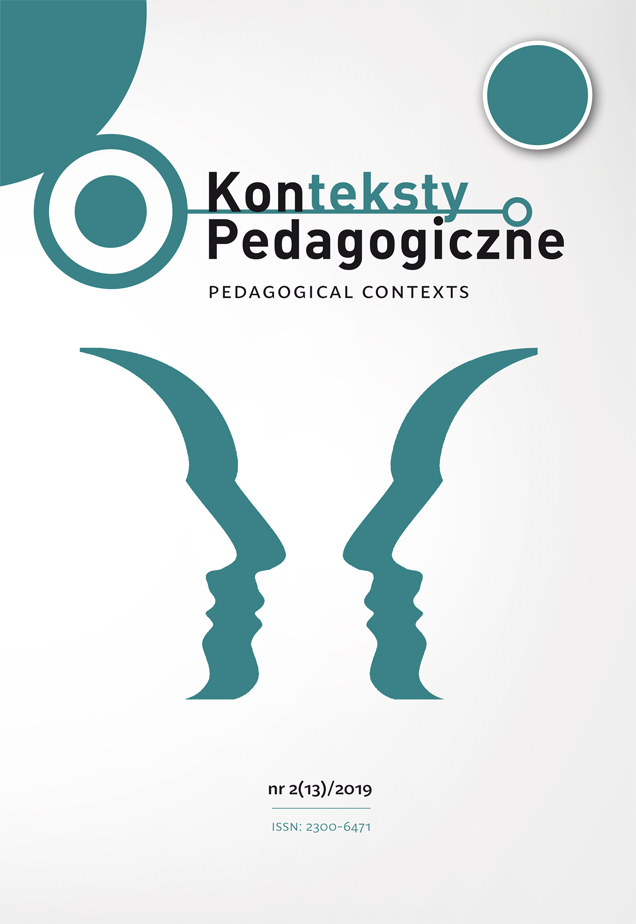Abstract
The article presents the results of pilot studies. It refers to the opinions of participants of mediation and mediators regarding the parties’ skills (with particular focus on communication skills). The study was conducted using questionnaires devised for this occasion (for both the participants in mediation and the mediators). What is worth noting are the convictions of the parties regarding their own communication skills, the diversity of the respondents’ opinions, inter alia, in terms of their interpersonal skills and the ability to communicate their own needs, the high degree of emotion and the ways of dealing with clients’ emotions indicated by mediators. In the opinion of the mediators, the parties have high self-presentation skills but at the same time are not able to accept either criticism or praise. Differences in communication styles and decision-making methods for women and men participating in mediation were indicated. Moreover, the major areas of communication and taboo in the process were identified. The research leads to the conclusion that family mediators should take into account the possibility and preparation of the parties, so that they can be more effective.
References
Baruch Busch, R.A. and Folger, J.P. (2004). The Promise of Mediation: The Transformative Approach to Conflict. San Francisco: Jossey-Bass.
Charkoudian, L., Walter, J.L. and Thomson, D. (2018). What Works in Custody Mediation? Effectiveness of Various Mediator Behaviors. Family Court Review. An Interdisciplinary Journal, 56(4), 544–571.
Cybulko, A. (2019). Mediacja cywilna i rola mediatora w ujęciu psychologii społecznej [Civil Mediation and the Role of Mediator in Social Psychology]. Doctoral dissertation written under the supervision of prof. dr hab. Małgorzata Fuszara. Uniwersytet Warszawski.
Gmurzyńska, E. and Morek, R. (2009). Mediacje. Teoria i praktyka [Mediation. Theory and Practice]. Warszawa: Wolter Kluwer Business.
Dziugieł, I. (2003). Mediacja w postępowaniu przygotowawczym [Mediation in Preparatory Proceedings]. Szczytno: Wydawnictwo Wyższej Szkoły Policji.
Harwas-Napierała, B. (2008). Komunikacja interpersonalna w rodzinie [Interpersonal Communication Within the Family]. Poznań: Wydawnictwo Naukowe Uniwersytetu im. Adama Mickiewicza.
Holska, A. (2016). Teorie podejmowania decyzji. In: K. Klincewicz (ed.), Zarządzanie, organizacje, organizowanie – przegląd perspektyw teoretycznych (pp. 239–251). Warszawa: Wydawnictwo Naukowe Wydziału Zarządzania Uniwersytetu Warszawskiego.
Lubas, K. (2017). Świadomość społeczeństwa i jego wiedza na temat alternatywnego sposobu rozwiązywania sporów – mediacji [Public Awareness and Knowledge of Mediation as An Alternative Dispute Resolution]. Studenckie Zeszyty Naukowe, 20(33), 21–39.
Matraszek, K. and Such, J. (1989). Ontologia, teoria poznania i ogólna metodologia nauk [Ontology, Cognitive Theory and General Methodology of Science]. Warszawa: Państwowe Wydawnictwo Naukowe.
Morris, M., Halford, K.W., Petch, J. and Hardwick, D. (2016). Predictors of Engagement in Family Mediation and Outcomes for Families that Fail to Engage. Family Process, 57(1), 131–147.
Moore, Ch. (1996). The Mediation Process. Practical Strategies for Resolving Conflict. San Francisco: Jossey-Bass Publishers.
Nikołajew, J. and Leśniewska, G. (2012). Podejmowanie decyzji i osiąganie celów w życiu rodzinnym [Decision-making and Achieving Objectives in Family Life]. Management and Business Administration. Central Europe, 21(1), 137–144.
Palka, S. (2006). Metodologia, badania, praktyka pedagogiczna [Methodology, Research, Pedagogical Practice]. Sopot: Gdańskie Wydawnictwo Psychologiczne.
Parkinson, L. (2019). Wider Perspectives in Family Mediation: An Ecosystemic Approach. Australian and New Zeland Journal Of Family Therapy, 56(4), 62–73.
Podolas, I. (2014). Mediacje i negocjacje w pracy socjalnej [Mediation and Negotiation in Social Work]. Warszawa: Centrum Rozwoju Zasobów Ludzkich.
Przybyła-Basista, H. (2006). Mediacje rodzinne w konflikcie rozwodowym. Gotowość i opór małżonków a efektywność procesu mediacji [Family Mediation in a Divorce Conflict. Spouses’ Readiness and Resistance Versus the Effectiveness of Mediation Process]. Katowice: Wydawnictwo Uniwersytetu Śląskiego.
Rostowska, T. (2001). Konflikt międzypokoleniowy w rodzinie: analiza psychologiczna [Family Intergenerational Conflict: A Psychological Analysis]. Łódź: Wydawnictwo UŁ.
www.mediacja.gov.pl/files/doc/rk-mediacje-agrotec-02.09.pdf/ [accessed: 9.09.2019].
Zumeta, Z. (1998). Styles of Mediation: Facilitative, Evaluative, and Transformative Mediation, https://www.mediate.com/articles/zumeta.cfm [accessed: 16.12.2019].
In accordance with the recommendation of the Ministry of Science and Higher Education, which aims to counteract the practice of “ghostwriting” and “guest authorship,” all authors submitting their text for publication should attach an author’s statement which declares the contribution of each of the authors to the article. The printed and signed statement should be delivered by mail or other means to editor-in-chief Joanna Skibska or sent in the form of a scan to the following e-mail address: redakcja@kontekstypedagogczne.pl. The authors will not receive remuneration for publishing their papers. The editors reserve the right to make minor editorial changes to the articles which will not affect the substance of the article. We encourage all authors to prepare their articles in accordance with the guidelines for manuscript preparation. Download pdf file.
Authors transfer all copyrights and grant the journal the right of first publication with the work simultaneously licensed under a Creative Commons Attribution License that allows others to share the work with acknowledgement of the work's authorship and initial publication in this journal. All authors agree to the publishing of their email addresses, affiliations and short bio statements with their articles during the submission process.

